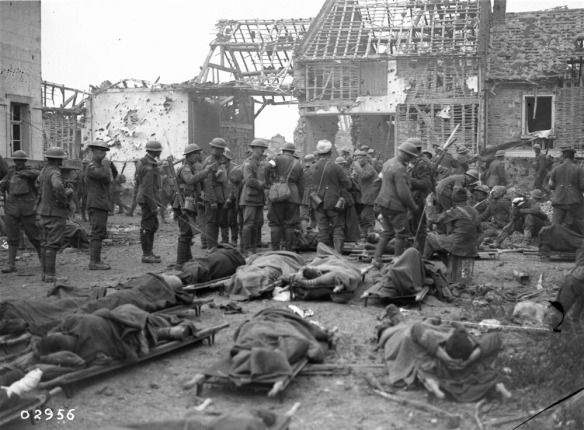By Kelly Anne Griffin
Alex Gibson was an immigrant, a veteran of the First World War, a mill worker and a poet. His experiences are reflected in Grist for the Mill, a book of poetry that he self-published in 1959. A copy of this book was discovered during the processing of the archival records of the Canadian Paperworkers Union.
Gibson was born in 1893 in Scotland, and he immigrated to Canada around 1913. He enlisted with the Canadian Expeditionary Force in the 10th Field Ambulance Battalion. Many of the poems in his book deal with the challenges of adjusting to the often routine life of working in a paper mill after surviving the horrors of war. Many young Canadian men faced similar challenges when they returned from the war in Europe.
He contemplates the struggles of returning soldiers in “What Shall It Be”:
What shall it be when victory’s won
And our men come marching home;
Shall it mean the same as it always means –
The broken lives and the shattered dreams
And a desolate land to roam?
[…]
Answer ye men of the shop and rail –
The mill and the mine – the sea and the mail,
For answer it ye shall?
(pp. 90–92)

The 10th Field Ambulance Battalion of the Canadian Expeditionary Force at the Battle of Amiens in August 1918. Gibson served in the field, caring for the wounded after battle. This devastating experience underlies his poetry (a002864-v8).
Gibson worked in the pulp and paper industry for over 38 years and was passionate about labour issues. He served in several important roles within the Canadian Paperworkers Union during his career. He even ran for federal office in the riding of Port Arthur in 1935 and 1940 for the Co-operative Commonwealth Federation. This party, a predecessor of the New Democratic Party, was dedicated to progressive social and labour issues. Gibson’s socialist stance is clear in nearly all of the poems in the book, which provides an informative first-hand account of working-class struggles. The plight of the worker and the need for workers to come together in a strong brotherhood are recurring themes. In “Hoboes and Heroes,” he writes about the class of society that could be called the working poor:
He said that every place he went
He found that there were thousands such as he;
Who, with the last of all their money spent
Were forced to beg for charity.
[…]
And as he spoke I sensed the bitter note.
Of dark despair, the utter lack of hope.
(pp. 77–80)
Working for over three decades in a factory, and being active in union activities, Gibson was acutely aware of the hardships and struggles in a production mill. These come up frequently in his writings. Days were long, pay was poor and conditions were not as regulated as they are today. He continually tried to improve this situation through his work with the union. The vivid picture he paints of what life was like for these men shows his empathy for his fellow workers. In the book’s dedication, he writes:
To ye who toil in the murk;
To ye who swine in the drift
Making an epic of work,
Single or double shift.
Knowing you as I do;
Living the life you live,
This is my gift to you,
All that I have to give.
(p. 3)

Worker in a pulp and paper mill operating a grinder machine. Gibson’s poetry often describes the monotonous and dangerous conditions in mills and the effects on workers. Photo taken by Harry Foster (e000761635).
Most of Gibson’s poems cover issues relating to labour and social injustices in Canada, but some provide glimpses into important moments in history. “A Constitutional Crisis” relates the abdication of Edward VIII to wed twice-divorced Wallis Simpson, a huge scandal at the time. “A Note to the Hon. Minister of Justice” is about the jailing of Tim Buck, a leader in the labour movement. Buck’s imprisonment at Kingston Penitentiary caused much public outcry, especially among labourers like Gibson.
This collection of poems, though written primarily about personal conflicts and workers’ struggles, has an underlying tone of hope. Many of Gibson’s poems are still relevant for Canadian readers today. This is one reason why Grist for the Mill is a true treasure in the collection of Library and Archives Canada.

Wow. Very well written and presented and emotionally moving.